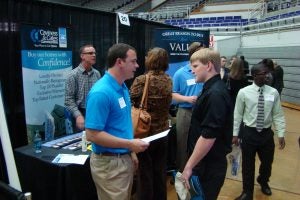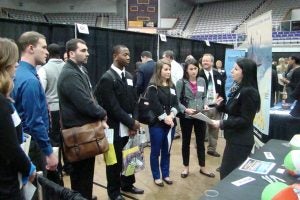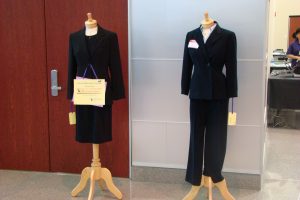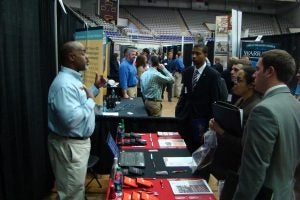September 25, 2014
Prepare Yourself for Securing A Job
Tips for success
The CoB Career Center sponsors a variety of career fairs throughout the academic year. This guide will help you prepare for them and help you make the most of your time while you’re there.
Reasons to Attend
Regardless of your major, year in college, or future goals, there are many benefits to attending a career fair. You can:
• Investigate positions and career fields you could pursue with your major and background
• Meet representatives from organizations for whom you are interested in working
• Get more information about specific companies and organizations
• Gain valuable interview / networking experience
• Increase your chances of interviewing with an employer
• Receive sound job search advice from seasoned company recruiters
• Develop your network of contacts
What to Expect
Typically, career fairs host groups of employers from specific geographic regions or employers that recruit for similar industries or sectors. Employers expect to interact with students seeking job opportunities as well as those simply researching careers and organizations.
Most career fairs are held in one large room. Rows of tables are staffed by representatives from the participating organizations and decorated with table-top displays.
Student registration tables are usually located at the entrance to the career fair. Here, you might be asked to sign in, create a name tag, and complete a brief questionnaire. Lists of attending organizations and maps identifying their locations may also be available.
How to Prepare
If you are attending a career fair in search of job opportunities, you should prepare for the experience as you would for an interview.
1. Review the list of organizations that will be attending the fair, then research those employers of interest to you. Visit the CoB Career Center for company literature, and do research on the organization’s website.
2. Ensure that your resume reflects your most current accomplishments, skills, and experiences. Print an adequate supply of your resume.
3. Practice answering specific interview questions and prepare questions you would like to ask the employers.
4. Consider how you will dress. If you are exploring job opportunities, you should dress in professional business attire.
5. Prepare a strategy for working the fair. Prioritize the employers with whom you’d like to speak, identify the information you want to get from them, and specify goals you hope to achieve by attending the fair.
At the Fair
Don’t ask what positions the employers have; tell them what you’re seeking. If you aren’t sure of the job titles, begin by telling them your major, what you enjoy doing and ask where there might be a fit. Employers respond positively to this direct approach.
Keep your communication brief and to the point. You may want to meet with many employers, and employers will want to meet with as many students as possible. Prioritize your time to meet with all the employers on your list. Be sure to give your resume to each employer, and also get a business card from a representative at each organization that interests you.
Sample Questions You May Ask
Do your homework before you attend the fair and find answers to as many of these questions as possible – it shows the employer you are serious about your candidacy.
Internships
• Do you have a formal internship program?
• Do you have an internship coordinator I could contact?
• When is the best time to apply for an internship?
• What experiences might I have as an intern in your organization?
• Do you offer both paid internships and those for academic credit?
• What courses or majors do you look for in potential interns?
Jobs
• After you describe your academic and work experience: What are typical entry-level positions for someone with my major, skills and experience?
• What skills do you look for in candidates?
• What type of previous work experiences do you look for in candidates?
• What’s the best way to apply to your organization, and how long does the process usually take?
• Will you be on campus to interview?
Sample Questions They May Ask You
• When are you available to begin working?
• Are you interested in full-time or internship opportunities?
• What kind of position are you looking for?
• What geographic areas are you interested in?
• Why did you stop at our table today?
• May I have a copy of your resume?
After the Fair
Within two weeks of the fair, make follow-up contact with the representatives you spoke to, unless you have discussed an alternative arrangement. Employers may leave a fair with hundreds of resumes, and they report that less than 5% of students follow up after a fair. This simple step can give you a big advantage.
Recruiters share the ingredients of a great first impression:
“A firm handshake and introducing yourself.”
“Let me know what your major is and what type of position is interesting to you.”
“Good eye contact and speaking clearly.”
“The time with each student at a career fair is brief, so a student who can get his or her point across in about 1 minute is way ahead of others.”
- Categories:
- Cunanan Center for Professional Success





